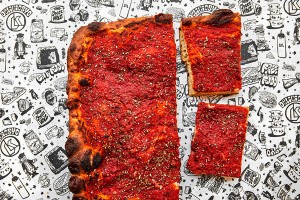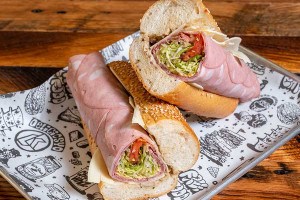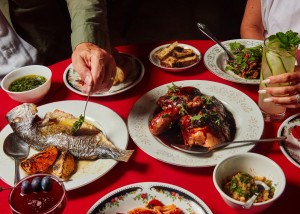Just One Dish: Chuck Rice and Gravy from Kings and Queens Liberian Cuisine
The story behind this Liberian staple dish, how it’s made, and why you should be going out of your way to eat it.

Chuck rice and gravy from Kings and Queens Liberian Cuisine in Upper Darby / Photography by Paolo Jay Agbay.
I’m sitting in the front seat of my Toyota Corolla on Fairfield Avenue in Upper Darby and a hot-bottomed takeout container of Kings and Queens’ gravy is burning the tops of my thighs. The Liberian dish, which is often made in home settings and served with a side of bright green chuck rice, shimmers deep brown-red and runs thick against my plastic fork. It’s rich, savory and layered, with a fried croaker fish half-submerged in the gravy and winking at me like he knows something I don’t. A textbook umami bomb, the gravy’s flavor feels like it finds its way into every corner of my mouth. One bite and I can’t not go back for more. My heart rate speeds up like I’m listening to a perfect, danceable song for the first time or perhaps sprinting. I down a few forkfuls and turn to my boyfriend, who is patiently waiting for me to hand over the gravy. “There’s gotta be MSG in here,” I say. “Nothing in life tastes this good without MSG.”
“People don’t believe they’re eating vegetables,” Kings and Queens Liberian Cuisine’s owner Sammed Okyne tells me later on the phone when I ask about the dish. Okyne prepares his gravy by steering away from the traditional method, which blends bell peppers and onions into a chunky paste and then fries the mixture in vegetable oil. In his version, Okyne adds eggplant and zucchini as well. Then Okyne seasons the vegetables with garlic powder, salt, and pepper, plus vita cubes and Knorr — hello, culprit behind the umami/MSG sensation. He throws in a hearty nub of tomato paste and lets everything cook down long enough so that all of the excess moisture evaporates. What’s left is a concentrated vegetable festival: luscious from the decimated eggplant and onions, fried and salty from the magic of vita cubes meeting hot oil.
The majority of Liberian food is vegetable-based, Okyne says, which explains why the menu at the restaurant predominantly shows off stews and soups like okra sauce, beans torborgee, pepper soup, palava sauce, pumpkin soup, and peanut-butter soup. By comparison, chuck rice and gravy is considered a luxury, since each portion of gravy contains hunks of smoked turkey wings and chicken thighs, as well as a whole fried fish. “The more variety of meat you have, the richer you are,” Okyne says. “The more you could afford those things.”
While the fried vegetable mixture cooks down, Okyne fries a whole croaker in another pan. Separately, he steams pieces of smoked turkey legs and chicken thighs in a vat of tomatoes, onions and bell peppers. Once the fish, chicken, and turkey are cooked through, they’re added to the original veggie pot. The result is a gravy swimming with fish and poultry, both of which miraculously stay crispy on the outside and soft, flaky and gorgeous on the inside. The gravy comes with a side of thoroughly vegetal rice (Okyne says Liberians often refer to this as “check rice,” though the Kings and Queens team calls the dish, “chuck”) that’s made by incorporating a blend of boiled okra and spinach into white rice.
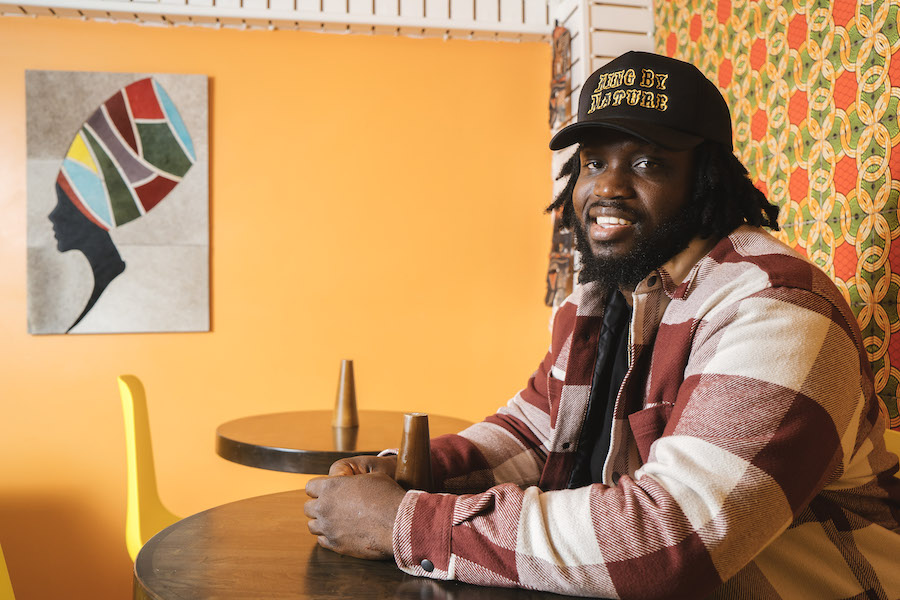
Owner Sammed Okyne
Managing cook time is essential to pull off the gravy correctly: “Cooking Liberian food is not a 20-minute thing, it takes about an hour and a half, or more. There’s an art to it, and there’s a lot of love when we’re cooking these dishes. Not anybody can just do it.”
Okyne opened Kings and Queens with his aunt and his mom eight years ago. At the time, he had just graduated from Penn State with a degree in business management and marketing. He was looking for his next move, feeling uninspired by a job in radiology. He “took a leap of faith,” found a tiny water-ice window at 49th Street and Woodland Avenue, and started cooking the Liberian dishes he knew and loved while growing up in Southwest Philly.
In the early days of the business, Okyne would stand by the trolley and give out free samples of chuck rice and gravy in two-ounce cups to attract new customers. “The gravy was one of the easiest things to sell,” he says, since Okyne could easily describe the dish to trolley riders who weren’t familiar with Liberian cooking. Whereas he says he “couldn’t really explain cassava leaves” to the uninitiated. Soon, people in the neighborhood responded. They showed up to the Kings and Queens’ takeout window in droves, so much so that Okyne and his partners eventually had to move the business to a larger space in Upper Darby.
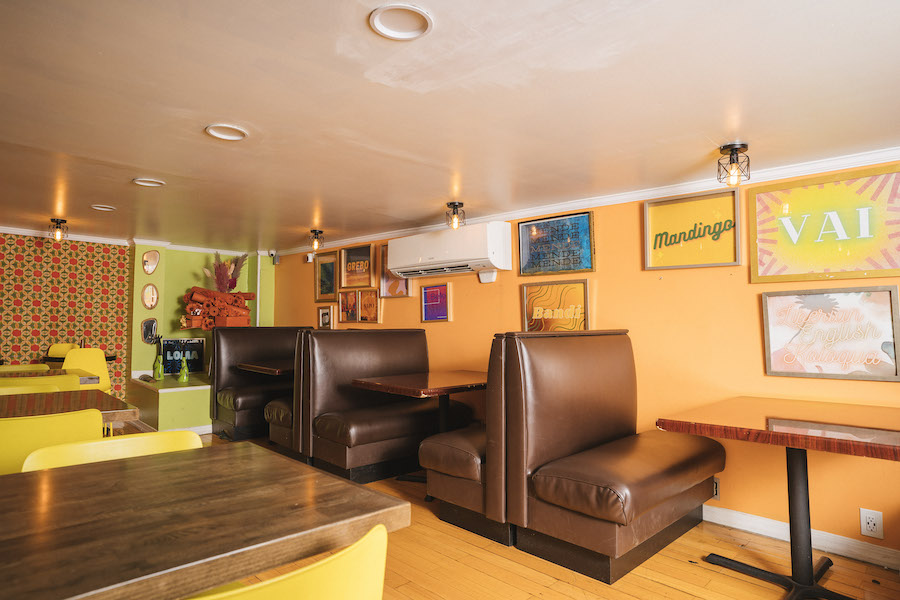
The newly renovated upstairs dining room at Kings and Queens Liberian Cuisine
“Liberian culture has grown so much in Philadelphia,“ Okyne says. “There has been a tremendous rise of people [showing interest in] tasting Liberian food.” He’s even noticed that restaurants serving food from other African countries like Mali or Senegal will offer cassava leaves and potato greens in addition to their own specialities, “because they know that’s a Liberian dish that sells.” Kings and Queens’ own business continues to grow, too. This month, Okyne and his team are unveiling a renovated upstairs dining area for guests to sit and enjoy their food (takeout currently makes up most of their business, as a way to cut down on staffing costs and offset the surging price of ingredients, many of which are imported from West Africa). Kings and Queens will also start brunch service on February 19th.
Okyne estimates that 60 or 70 percent of his Philly customers haven’t tried Liberian food before they visit Kings and Queens. A few years into running the business, he decided to change the original name from Kings and Queens African Cuisine to its current iteration, as a way to declare his heritage and pride for the cuisine. “The goal has always been introducing as many people to the experience of Liberian cuisine — and giving people the experience of Liberian culture through the food — as possible.” If you’re looking for a way yourself, let Kings and Queens’ chuck rice and gravy be your portal. You’ll never look at a bell pepper the same way.
